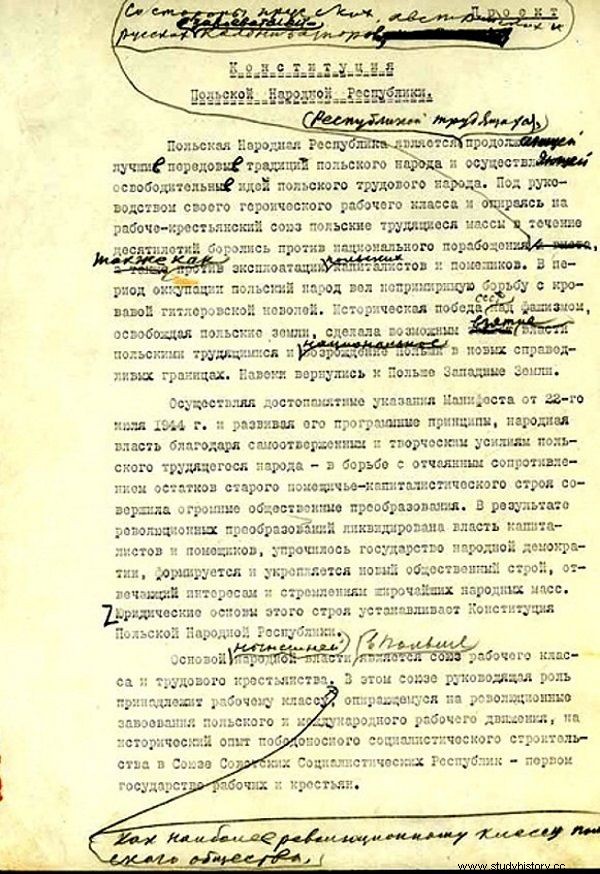To get behind bars, it was enough to take a few pieces of candy or a piece of lard from the workplace. If someone was tempted by a more luxurious commodity, such as meat, that was the way to say goodbye to life. The absurdity of sentences in the times of the Polish People's Republic not only amuses but also terrifies
The People's Republic of Poland is an era full of absurdities and contradictions. Difficult material conditions caused by low wages and the unavailability of many goods on the market forced Poles to cope in various ways. From a friend of the shop assistant you could get goods "under the counter", i.e. hard-to-reach products of better quality.
A doctor he knew, after receiving a bribe, was eager to write out sick leaves. The home budget was repaired by "taking out" various products from work:from toilet paper to building materials. And although there was consent among the public to many ethically questionable behaviors, the judiciary severely punished those who committed theft. And some sentences were ridiculously high for the size of the offense committed.
Prison for theft of a razor blade
We read about the risk of high penalties for petty thefts in the latest book by Kazimierz Kunicki and Tomasz Ławecki, Economic affairs of the Polish People's Republic. Afters, speculators, blackmailers ". For the appropriation of two shirts, underpants and 18 hens, you could face a sentence of 7 years and 6 months imprisonment - a man found out in 1958, who grazed on someone else's property and was caught.

The draft of the Constitution of the People's Republic of Poland with the amendments made by Stalin. Many trials, which resulted in absurd sentences, took place against the constitutional provisions.
The colleague with whom he committed the robbery was sentenced to two years in prison. Undoubtedly, such a severe punishment was intended to scare Poles and discourage them from committing even petty thefts. However, my countrymen continued to steal by force - even underwear from the hospital. The culprit who stole it ended up in jail for 8 months. The same penalty was imposed for the theft of imported razor blades.
A ruthless law for young people
The misappropriation of scarce goods, such as meat, was also severely punished. A meat plant worker who illegally weighed 3 kg of pork fat, was imprisoned for up to four months. Taking the goods out of the workplace was also bitterly regretted by an employee of a candy factory, who was sentenced to a month in prison for stealing a few pieces of candy for a few days .
The law was inexorable also for minors. Children aged 10 and 15 went to a reformatory for stealing 4 hens and a rabbit from a state farm . Two teenage boys who stolen dolls from kindergarten were placed under probation. From the current perspective, not only the system of communist penalties seems strange, but also the goods that were the subject of the theft:candies, dolls, rabbits in retail quantities. What could be the use of nylon napkins stolen by a woman in the late 1950s? They certainly proved necessary to wipe away tears when she heard a one-month prison sentence in the courtroom.

Jerzy Czesław Blikle with a tray of donuts in the 70's. Despite an incident involving an arrest for buying 15 eggs, he has not given up running his Warsaw pastry shop.
One of the most bizarre cases was the arrest of Jerzy Blikle in 1956. The then owner of the famous Warsaw confectionery did not steal anything. He just bought 15 eggs in a store, which he ran out of for making confectionery. Blikle spent two days in custody for purchasing in a regular store for the needs of his private company . In those days, private entrepreneurs were considered speculators and all efforts were made to prevent them from running their business. In the People's Republic of Poland, individual and social property was distinguished. There were higher penalties for the theft of the latter.
Victim of the meat scandal
In the early days of the Polish People's Republic, the authorities announced that they would fight the scourge of theft by all means, which spread to the entire country plunged into post-war scarcity. Authors of the book “Economic affairs of the Polish People's Republic. Afehers, speculators, blackmailers "cite a fragment of the preamble to the Decree of March 4, 1953 on increasing the protection of social property:
Every violation of social property, its integrity and inviolability, however slight, should be severely punished and subject to moral condemnation from society .
The threat of punishment for reaching out to get your property sounded very serious. For example, could face up to 6 years in prison for "taking" milk out of the workplace .

The death sentence in the "meat" scandal shocked almost everyone. It was the implementation of Gomułka's idea to literally get rid of criminals. It is interesting, however, how much he himself got rich on many scams ... The picture shows Gomułka's house during his retirement in Konstancin-Jeziorna.
However, no one expected the death penalty for stealing food. This was the sentence passed in February 1965, during the trial of people involved in the famous "meat scandal". The case concerned the theft, forgery of documents, and the replacement of goods. During the investigation, as many as 400 suspects were arrested. The main accused, Stanisław Wawrzecki, director of the Warszawa-Praga company, was sentenced to death.
Many modern historians believe that the publicized trial was politically motivated. Gomułka wanted not only to punish people sitting on the dock, but also to show Poles who they should blame for the lack of meat on store shelves. The public reacted with indignation to the news that the court had sentenced Wawrzecki to death. It was commonly believed that the sentence was too high for the act committed. The convict was executed, however.
